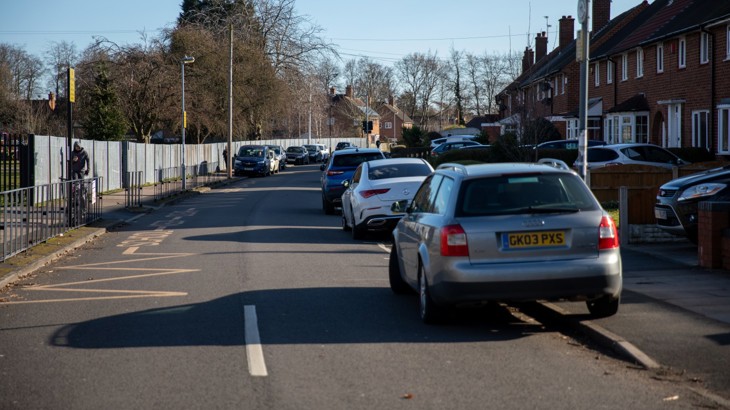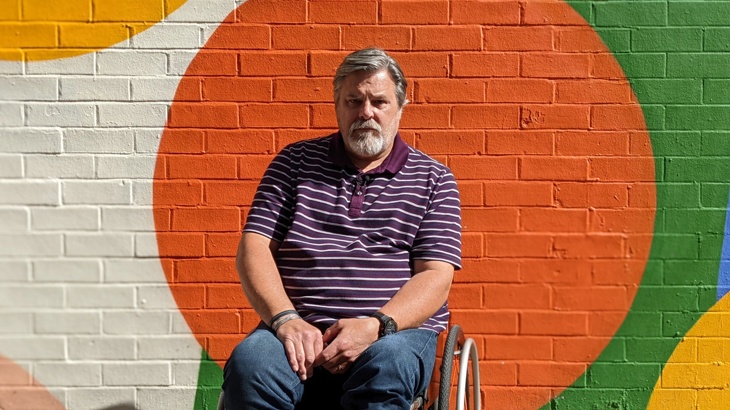For the last five years, more than 15,000 people have been waiting for a response from the Government. Dan Simpson, our Policy and Public Affairs Manager explains why it's time for the Government to give councils in England the power to enforce against pavement parking.

Parked cars can cause pedestrians, and parents with pushchairs into the road.
A clear path forward
There's nothing more frustrating than a pavement blocked by a car.
It's a problem that affects everyone, but it has a disproportionate impact on some of the most vulnerable people in society.
It makes life incredibly difficult for people who use wheelchairs or mobility aids, parents with pushchairs, and people who are visually impaired.
It can even force them to risk walking in the road.
The human impact
Phil Mears, who has used a wheelchair for 40 years, knows the struggle all too well.
He shared his experiences with us as part of our Disabled Citizens’ Inquiry.
Recently he told us: “The physical strain is obvious — jolts, awkward manoeuvres and the real risk of tipping into the path of fast-moving traffic — but the mental cost is deeper.
There is the steady drip of anxiety before every journey, the creeping erosion of independence and dignity, and the quiet anger of being made to plan my life around other people’s thoughtlessness.
Simple tasks turn into logistical nightmares; social invitations are declined; independence is chipped away, day by day.”
Phil’s not the only one whose independence is affected, by pavement parking and other barriers.
Overall, disabled people make 29% fewer trips than non-disabled people which limits their access to employment, training, and other opportunities.

Phil Mears wants to see greater powers given to councils outside of London.
A clear need for change
Across most of England, the Highway Code advises drivers not to park on the pavement, but it doesn’t prohibit it.
Understandably, these rules create confusion for drivers, and a survey by Living Streets found that just 5% of drivers understand the current rules around pavement parking.
This is just another reason why we need clearer regulations.
In London, though, you can only park on the pavement where there’s a sign showing the council’s judged it to be safe and necessary.
That’s been the case since 1974. Scotland followed suit in 2023.
This gives local councils the power and flexibility to do what’s right for their local community, while providing consistency whether you’re driving, walking or wheeling.

Pavement parking makes life more difficult for those dependent on mobility issues and the visually impaired.
Strong support for change
This isn’t an unsolvable problem, and we know there's strong public support for change.
In 2023, our Walking and Cycling Index report found that 65% of people want to give local councils the power to enforce pavement parking restrictions.
The Disabled Citizens’ Inquiry uncovered even greater support amongst people with mobility impairments (79%) and people who are visually impaired (84%).
Back in 2020, the Department for Transport opened a public consultation on pavement parking, and more than 15,000 people responded.
Five years later, we're still waiting for a response, and nothing has changed.
Becoming pathfinders
There is hope that change is ahead. Recently, 26 MPs attended a debate on pavement parking sharing moving testimonies about the difficulties their constituents have faced.
And 37 MPs signed an open letter adding to a growing consensus that the Government must respond to the consultation.
In response, then roads minister Lilian Greenwood gave a commitment to respond as soon as possible.
Our view is simple. It’s time to stop the anxiety, the physical strain, and the dangerous detours that pavement parking creates.
The Government should amend the English Devolution Bill and give councils in England the same enforcement powers that London and Scotland already have. It’d be a quick, cheap fix.
Ultimately, it would show that devolution isn’t about structures: it’s about changing lives.





